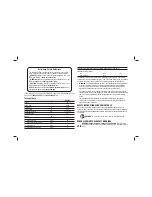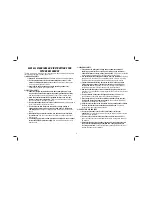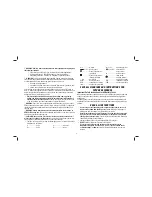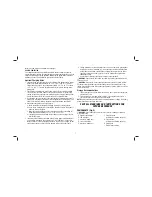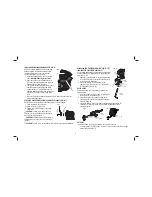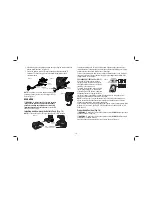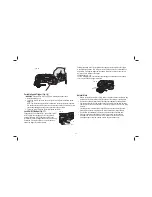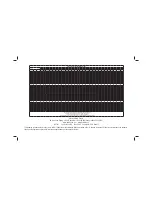
5
NOTE: Do not store the battery packs in a tool with the trigger switch locked
on. Never tape the trigger switch in the ON position.
WARNING:
Fire hazard. Never attempt to open the battery pack for any reason. If
the battery pack case is cracked or damaged, do not insert into the charger. Do not
crush, drop or damage the battery pack. Do not use a battery pack or charger that
has received a sharp blow, been dropped, run over or damaged in any way (e.g.,
pierced with a nail, hit with a hammer, stepped on). Damaged battery packs should be
returned to the service center for recycling.
WARNING:
Fire hazard. Do not store or carry the battery pack so that metal
objects can contact exposed battery terminals. For example, do not place the battery
pack in aprons, pockets, tool boxes, product kit boxes, drawers, etc., with loose
nails, screws, keys, etc. Transporting batteries can possibly cause fires if the battery
terminals inadvertently come in contact with conductive materials such as keys,
coins, hand tools and the like. The US Department of Transportation Hazardous
Material Regulations (HMR) actually prohibit transporting batteries in commerce or on
airplanes (e.g., packed in suitcases and carry-on luggage) UNLESS they are properly
protected from short circuits. So when transporting individual battery packs, make
sure that the battery terminals are protected and well insulated from materials that
could contact them and cause a short circuit.
SPECIFIC SAFETY INSTRUCTIONS FOR LITHIUM ION (Li-Ion)
•
Do not incinerate the battery pack even if it is severely damaged or is
completely worn out.
The battery pack can explode in a fire. Toxic fumes and
materials are created when lithium ion battery packs are burned.
•
If battery contents come into contact with the skin, immediately wash area
with mild soap and water.
If battery liquid gets into the eye, rinse water over the
open eye for 15 minutes or until irritation ceases. If medical attention is needed,
the battery electrolyte is composed of a mixture of liquid organic carbonates and
lithium salts.
•
Contents of opened battery cells may cause respiratory irritation.
Provide fresh
air. If symptoms persist, seek medical attention.
WARNING:
Burn hazard. Battery liquid may be flammable if exposed to spark or
flame.
Important Safety Instructions for All Battery Chargers
SAVE THESE INSTRUCTIONS:
This manual contains important safety and operating
instructions for battery chargers.
• Before using the charger, read all instructions and cautionary markings on the
charger, battery pack and product using the battery pack.
WARNING:
Shock hazard. Do not allow any liquid to get inside the charger. Electric
shock may result.
CAUTION:
Burn hazard. To reduce the risk of injury, charge only D
E
WALT
rechargeable battery packs. Other types of batteries may overheat and burst resulting
in personal injury and property damage.
NOTICE:
Under certain conditions, with the charger plugged into the power supply, the
charger can be shorted by foreign material. Foreign materials of a conductive nature,
such as, but not limited to, grinding dust, metal chips, steel wool, aluminum foil or any
buildup of metallic particles should be kept away from the charger cavities. Always
unplug the charger from the power supply when there is no battery pack in the cavity.
Unplug the charger before attempting to clean.
•
DO NOT attempt to charge the battery pack with any chargers other than the
ones in this manual.
The charger and battery pack are specifically designed to
work together.
•
These chargers are not intended for any uses other than charging D
E
WALT
rechargeable batteries.
Any other uses may result in risk of fire, electric shock
or electrocution.
•
Do not expose the charger to rain or snow.
•
Pull by the plug rather than the cord when disconnecting the charger.
This will
reduce the risk of damage to the electric plug and cord.
•
Make sure that the cord is located so that it will not be stepped on, tripped
over or otherwise subjected to damage or stress.
•
Do not use an extension cord unless it is absolutely necessary.
Use
of improper extension cord could result in risk of fire, electric shock or
electrocution.
•
When operating a charger outdoors, always provide a dry location and use an
extension cord suitable for outdoor use.
Use of a cord suitable for outdoor use
reduces the risk of electric shock.
Summary of Contents for XR Li-Ion DCS355-XE
Page 1: ...DCS355 XE 18V BRUSHLESS CORDLESS MULTI TOOL INSTRUCTION MANUAL ...
Page 2: ......
Page 15: ......



